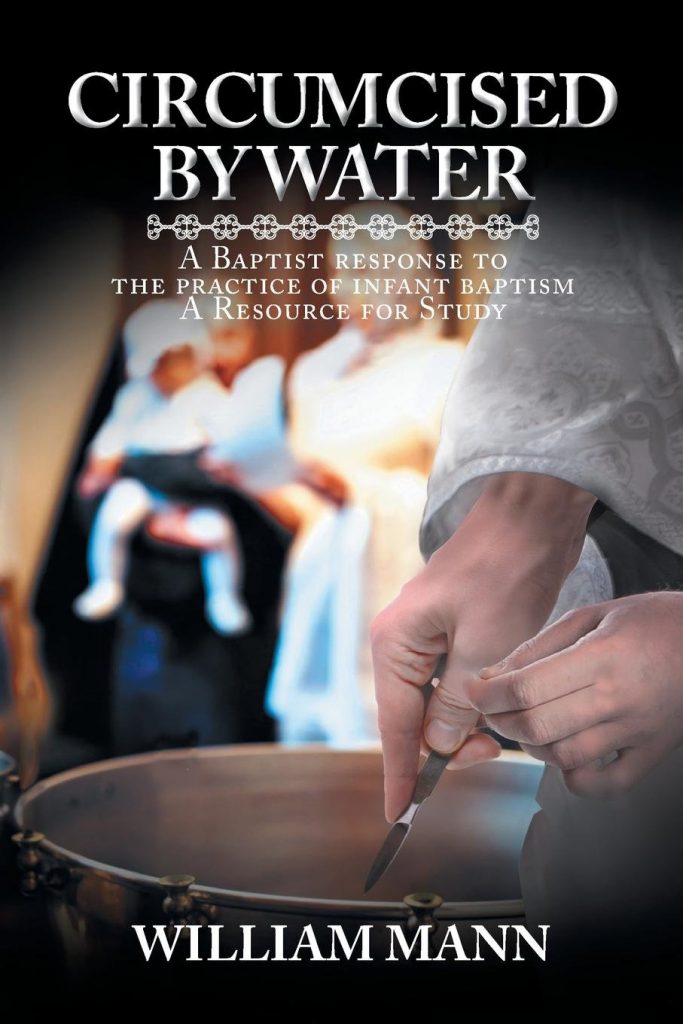It isn’t often that you come across a book that argues for age-old biblical doctrine in a fresh way, particularly when it comes to the subject of baptism. Circumcised by Water by William Mann aims to achieve that. Mann seeks to give a thorough argument, roughly 600 pages worth of content, against the practice of paedobaptism. His arguments are not, in essence, different that what has been historically argued for the last several centuries, but his attempt at using fresh language is what makes the work unique.
The book begins with context for why Mann sought to write the book. I appreciated how he used his own testimony of growing up in a paedobaptist tradition to bring both experience and weight to the question of paedobaptism’s validity. This is a brother who has experienced life in a paedobaptist covenant community and can speak experientially to its pitfalls. He then gives the broader historical context of how the practice of paedobaptism got its start, and why it has continued to be perpetuated throughout church history.
The crux of the book is spent evaluating, and tearing down, the mono-covenant model that is used to defend the practice of paedobaptism. He states the following regarding the importance of a mono-covenant for the paedobaptist model. “If we were to trace the source of all the confusion back to its roots, the Reformed mono-covenant thesis would clearly stand at the epicenter of it all. In its attempts to homogenize the rich and progressive scriptural witness into a flat, singular arrangement, the result has been nothing more than the perversion of the Gospel message itself.”[1] Mann rightly spends much of the book explaining why the Old Testament covenants are not the covenant of grace, and how a right view of the Old Testament covenants corrects one’s thoughts on what biblical baptism is for the new covenant community. In his arguments against a mono-covenant theology, he consistently points to a hermeneutic of type/fulfillment. He seeks to explain how the type of circumcision is not directly fulfilled in baptism, but rather it is fulfilled specifically in the incarnation of Christ. This is one of the weaker aspects of the book, as I’ll dive into shortly, but I appreciate Mann’s attempt at using typology to argue for believer’s baptism.
He also seeks to bolster his argument through an explanation of the two priesthoods we see in Scripture. He rightly states that the practice of paedobaptism does not do justice to the argument that the book of Hebrews makes regarding the priesthood of Christ and what his role means for the new covenant believer. This was one of the strongest sections of the book in my opinion. Paedobaptism seeks to bring over, into the new covenant community, the practices and ideologies of a Levitical priesthood when the New Testament makes clear that Christ’s new covenant of grace is mediated through the priesthood of Melchizedek. With a change of priesthood there is a necessary change of law (Hebrews 7:12). Mann writes the following about this misunderstanding of the two priesthoods. “Indeed, as no two priestly orders can possess the same qualifications, neither can they dispense with the same requirements for covenant relationship. It is upon this basis that the dual stipulations of birthright and faith have come to vie with each other for the spot of being the real, authentic term of the covenant.”[2] Another helpful section of the book focused upon the nature of the new covenant community. Mann rightly reminds the reader that the new covenant community is a spiritual kingdom and no longer a physical nation. Right thinking as to what the kingdom of God is in this age greatly aids us in thinking rightly about the nature of baptism.
Though there are many commendable aspects of this work, I was also left scratching my head at a couple points. Mann often speaks of covenant theology as if paedobaptists have a monopoly on the usage of that term. He argues his points in a way that makes it seem as if he has not engaged with, or even encountered, a robust, baptist covenant theology. This, in my opinion, detracts from, rather than aids, the argument he seeks to make. At times it felt as if Mann was making his arguments isolated from much of the rich credobaptist arguments of our Reformed Baptist forefathers. Though biblical, his arguments would only have been bolstered by placing himself well within the Reformed Baptist tradition.
As well as his seemingly ahistorical approach, his arguments also suffered from a more simplistic use of typology. As mentioned before, Mann argues that the antitype of circumcision is merely the coming of Christ. While Christ is surely the fulfillment of the law for His new covenant people, I believe that circumcision, and its antitype, ought to be more narrowly defined. Throughout the Old Testament we can see that physical circumcision not only was a boundary marker for God’s national people, but it also acted as a sign that was meant to point out one’s need for a circumcision of the heart. This need is later realized through the new birth or conversion. While all those who were members of the old covenant were circumcised physically, all those who are members of the new covenant of grace are those who are circumcised in heart. So while the coming of Christ to inaugurate the covenant of grace is what brings physical circumcision to its lawful end, it is more helpful to point to the new birth of the believer as the antitype of physical circumcision.
All in all, I greatly appreciated much of what was said in this work. Any reader can tell that Mann has spent years meditating upon Christian baptism, and the fruits of his labor are encouraging to anyone who chooses to pick up and read. This is a work though that would pair well with another work on baptism that is more grounded in history and Reformed Baptist tradition. I highly recommend reading this alongside Fred Malone’s Baptism of Disciples Alone.

















